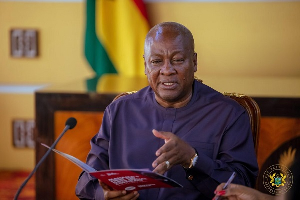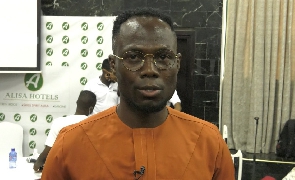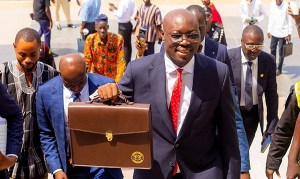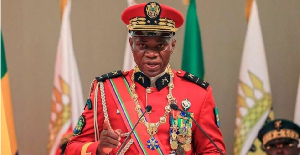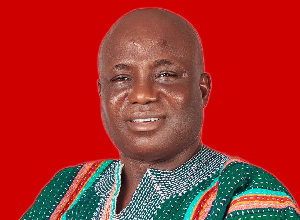On the occasion of Republic Day celebrations I will like to share with Ghanaweb readers a short biography of the man who led Ghana to independence. At the height of the Pan-African movement, the African continent unearthed one of its principal catalysts for independence and the possible realization of a united Africa; it was the emergence of Osagyefo Dr. Kwame Nkrumah.
Nkrumah was born in the village of Nkroful in the Nzema area of the then Gold Coast. Like many villagers and Africans of Nkrumah’s era his parents were uneducated. Yet his parents were anxious for him to be educated and ensured that he attended school. Nkrumah did not initially enjoy school but he soon grew to love it. Upon completion of his elementary schooling he became an untrained teacher, he was that impressive that he was recommended to the prestigious Achimota College, a government teacher training school. There Nkrumah was taken by Kwegyir Aggrey, the assistant vice-principal and only Blackman on the Achimota College staff. It was this experience that motivated him to further his education.
It suggested by some commentators that Nkrumah left for the USA seeking greener pastures and to a large extent it was true. Whiles in the USA, Nkrumah obtained two masters in education and philosophy from the University of Pennsylvania, a degree in Sacred Theology from Lincoln and enrolled in a doctoral program in philosophy.
The foundations of his political activities begun around this period when he helped organize the African Students’ Association of America and Canada [A.S.A.A.C.], which he became president. Many of the ASAAC members returned home later to lead the political struggle for independence. In America, Nkrumah as a student was influenced by many political and sociological ideologies. In sociology he admired the work of E. Franklin Frazier of Howard University and M.J. Herzkovits of North Western University who commented on whether the African American had lost cultural contact with African.
He read Hegel, Karl Marx, Engels, Lenin and Mazzini and was particularly impressed by Karl Marx and Lenin and they were to shape his revolutionary ideas to a large extent. It was through his involvement with Trotskyites that he met C.L.R. James, at the time a prominent Pan-African theorists. His most influential book was the Philosophy and Opinions of Marcus Gravey, which fed his enthusiasm for ending colonialism and imperialism on the continent. His study of all these thinkers and organizations was for him to learn the technique of organization and developing a type of organization apt for the African independence struggle which he foresaw as the key to liberation.
The reason why Nkrumah left the USA for London is not clear, but the enthusiasm with which he plunged into political activities when he arrived and his expression of a desire to return to Ghana in the immediate future suggested that he felt that West African political struggle was centered in England and he needed to be at the center of it. He left for London in 1945 and on his arrival he got involved with Pan-African politics immediately, befriended people like Padmore, Kenyatta and Wallace-Johnson and he was elected vice-president of the West African Students Union (WASU).
He was deeply involved in anti-colonial activities and was a contributor to Pan-Africa, a mouth piece of the Pan-African Federation and The New African journal, the voice of WASU. It was in London that he published his pamphlet “Towards Colonial Freedom” and in that piece he underscored his abhorrence of all colonial policies and contended that it was the aim of colonization to keep the local people economically dependant and the state primitive. For him the colonialists were not going to hand over freedom on a silver platter and had to be forced out of them. Also within this period he teamed up with Kenyatta, Padmore, Makonnen, Milliard and other Africans in Britain to help organize the 5th Pan-African Congress in Manchester, which was the most significant Pan-African Congress recorded, for its attendance and resolutions. Between 1945 and 1947, Nkrumah was traveling in Europe organizing other African Students, especially in France, where he encouraged his fellow Africans to return to Africa to join the struggle which he saw as essential. In 1947 he received an invitation from the United Gold Coast Convention (UGCC), lead by J.B. Danquah to help with the nationalist movement.
Nkrumah had been invited to serve as a General Secretary of the party on recommendation of Ako Adjei his Lincoln Alumni. On his way by sea he stopped over in Sierra Leone and Liberia to find out the political situation there. One could see from early stages of Nkrumah’s political actions and philosophy that he wanted the end of colonialism and imperialism of all Africa. In the Gold Coast Nkrumah employed his incredible organizational skills to establish the Gold Coast Party as the leading party for independence.
He later came to disagree with the policies of the UGCC which were prepared to use legitimate and constitutional means to achieve independence, Nkrumah advocated for self government now. This led eventually to the formation of the Convention Peoples Party (CPP) by Nkrumah in the aftermath of the 1947 riots and the arrest of the Big Six. Nkrumah’s party was to eventually win the 1951, 54 and 56 general elections to confirm the party’s popularity with the people and it was then stated that Ghana would be independent on 6th March 1957 which duly came to pass.
The bane of Nkrumah’s Pan-African philosophy was revealed in his dealings with difficulties of developing Ghana. He wanted to pursue a socialist agenda but he was quite aware of the need to initially rely on western technology to implement his developmental plans, so he did not want to attempt a whole sale war against imperialism at this stage. He however saw the solution in an “All African Union Government pursuing policies and planning the economic development of Africa as a whole”.
Indeed the independence of Ghana was very symbolic for the Pan-African world, all Pan-Africanists saw it as the torch bearer in the realization of the African decolonization. Nkrumah’s remark on Independence Day that “the independence of Ghana is meaningless until it is linked to the total liberation of the African continent” was in recognition of the role that he saw for Ghana in the liberation of the rest of Africa. Even in his developmental programs like the Akosombo Dam and the subsequent negotiation of Valco Aluminum Plant, exhibited his compromise on capitalism to ensure the country could offer help to its neighbors.
For example he opened a new Institute of African Studies as part of the new University of Ghana, the staff and students of the African institute were tasked to do “a reinterpretation and a new assessment of the factors making up the African past, and of the origins and culture of people of African descent in the Americas and the Caribbean”. Nkrumah saw Ghana as contributing to the advancement of knowledge of African peoples and culture. He founded the Encyclopedia Africana, which was edited by Du Bois, then settling in Ghana, to reinterpret and enhance African history from a Pan-African perspective. Certainly Ghana through Nkrumah was playing the role expected of him and in the 1950’s and 60’s many leading African American Pan-Africanists visited Ghana including Malcolm X and Martin Luther King. His activities to shore up the momentum of a liberated Africa, Nkrumah organized the 1958 All African People’s Conference in Accra which was attended by the then independent states of Africa to map out the road to freeing the rest of Africa. In 1961 he formed the Ghana–Guinea-Mali union which agreed to a loose union of states with Sekou Toure and Modibo Keita. Most important of all in 1963 the Organization of African Unity (OAU) was formed with the help of Haile Selassie of Ethiopia, Julius Nyerere of Tanzania, Kenyatta of Kenya and other African leaders to spearhead the unity of Africa.
What I find most impressive about Nkrumah was his literary works, during the struggle against colonialism and imperialism he was able to published 15 titles and each one of them was aimed at conscientizing the African on the path to dismantling colonialism and imperialism.
It can be said without doubt the he was far ahead of his time, especially with his book Neo-Colonialism: The Last Stage of Imperialism, which attacked, capitalism and multinational operations in developing countries and in many views hasten his demise.
The unfortunate demise of Nkrumah was his preparedness to do everything within his power to realize his dream of an African unity. To this end many of his critics accused him of utilizing the resources of Ghana to fund that agenda, whiles Ghanaians were suffering. Also he silenced his political opponents at home especially the intelligentsia who he believed did not share his dream and were bent on wrecking it. Towards this end he imprisoned many of his staunch critics like J.B Danquah who had brought him to the Gold Coast in 1947, Ako Adjei, who had recommended him to the UGCC, Joe Appiah his very good friend in London and served as Ambassador to London at some point and many more through his Prevention Detention Act. On the international scene he was very vocal and publicly criticized the activities of the capitalist nations which led to an aid embargo on Ghana which his opponents exploited. It was no surprise that with all the forces at work he was overthrown in 1966 while away on a trip to Vietnam and died later in Guinea where he lived in exile and died in 1967 at a Romania hospital.
As a Pan-Africanist his actions and thoughts was towards the realization of the principles that were expressed years before his emergence and he came closer that anybody in realizing that dream.



